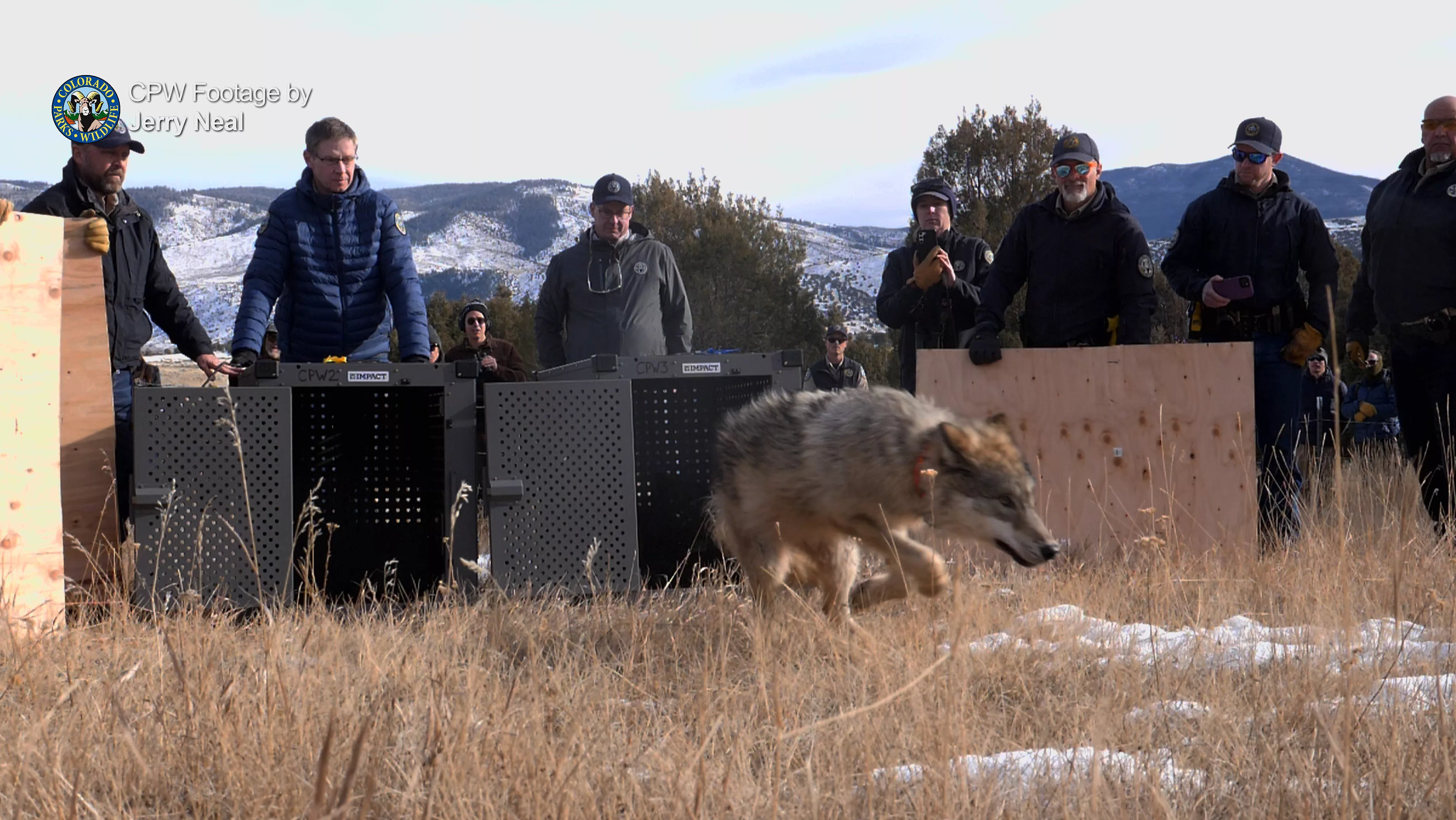
By Shannon Lukens. (File photo from Colorado Parks and Wildlife of a wolf being released in Colorado in Dec. 2023.)
The operation to bring 15 gray wolves from British Columbia to Colorado is underway. Colorado Parks and Wildlife and the Colorado Department of Agriculture have sent an update to confirm that it will happen sometime between January and March of 2025. The email says the groups have listened to feedback and plan to incorporate that feedback into an expanded and improved conflict minimization program for Colorado’s livestock producers. The email did not say where this next round of wolves will be released.
The email, which is below, adds information on the following:
- Site Assessments for ranchers are available. Call your area CPW office.
- Five Wildlife Damage Specialists have been hired and fire more will be added this month. A Wolf Conflict Coordinator was hired in 2022.
- Criteria for a Depredation Response will be included in the CPW Wolf Livestock Conflict Minimization Program Guide to be published this month.
- CPW is partnering with the Colorado Range Rider program that will launch in early 2025. Colorado Range Rider Program Interest Form
- Best Practice Recommendations for Carcass Management
- Grants of up to $20,000 are available.
- Communications and Training is available in the following places:
- December 11, 3 – 7 p.m. – Gunnison, Gunnison County
- December 12, 3 – 7 p.m. – Gypsum, Eagle County
- Wolf Reintroduction Listening Session is at 10 a.m. Wednesday, Dec. 18 in the Eagle County Room at 500 Broadway in Eagle
- December 19, 10 a.m. – 2 p.m. – Aspen, Pitkin County
- The email below also updates the first year of wolf restoration.
Also, the Colorado Conservation Alliance has also sent a letter (below) to Randene Neill, the Minister of Water, Lands and Resource Stewardship for British Columbia, via their attorneys, asking them not to release wolves to Colorado Parks and Wildlife. One line says, “Please be aware that we are prepared to take legal action against you pursuant to the citizen suit provision of the ESA, 16 U.S.C. § 1540(g), if British Columbia does assist Colorado in capturing, importing and/or transporting gray wolves into an area of the United States where they are federally protected. We would prefer not to resort to such action, but we are ready to do what is necessary to ensure that all applicable procedures are correctly and properly followed under law before any possible introduction of gray wolves occurs.”
This request from the Colorado Conservation Alliance joins others who have sent letters requesting wolf reintroduction either stop or be put on hold.
- Oct. 8, 2024 — CPW Commission gets another letter asking to pause wolf reintroduction
- Nov. 3, 2024 — CPW responds to requests from Club 20 about Wolf Reintroduction
- Sept. 30, 2024 — Colorado Ag Organizations petition CPW Commission before further wolf releases happen
These letters were provided from the Colorado Conservation Alliance to Steamboat Radio News.
Press Release from Colorado Parks and Wildlife and Colorado Department of Agriculture; Dec. 9, 2024.
DENVER — Operational planning is underway for the second capture and release season in support of the Colorado Gray Wolf Restoration and Management Plan. The operation is focused on translocating up to 15 gray wolves from British Columbia to Colorado between January and March, 2025, as announced by Colorado Parks and Wildlife (CPW) in September.
CPW has been listening to the concerns and recommendations of all stakeholders throughout the first year of gray wolf restoration. The agency has incorporated this feedback into an expanded and improved conflict minimization program for Colorado livestock producers.
“Through partnerships with the Colorado Department of Agriculture (CDA), the Colorado Wolf Restoration Ad Hoc Working Group, USDA-APHIS Wildlife Services, Colorado State University Extension, USDA Natural Resources Conservation Service (USDA NRCS) and NGOs, we are in a position to offer Colorado livestock producers an even more robust program that includes the tools, support and resources needed to minimize wolf-livestock conflict,” said CPW Director Jeff Davis.
The Conflict Minimization Program includes:
Site Assessments
Site assessments are a critical tool for identifying the most appropriate and effective non-lethal tools and techniques specific to each individual operation. Site assessments are free and are conducted by staff from CPW, CDA, USDA-APHIS Wildlife Services, and USDA NRCS, in collaboration with the livestock producer. CPW has recently updated and formalized the site assessment process for 2025. CPW strongly encourages producers to enroll in voluntary site assessments by calling their Area CPW Office or local CPW officer.
Through multiple and ongoing joint CPW and CDA conflict minimization meetings across the Western Slope, 22 producers have signed up to receive site assessments since October.
Conflict Specialist Capacity
CPW and CDA have significantly increased conflict reduction specialist staff throughout the first year of wolf restoration. Between April and June, CPW brought on five wildlife damage specialists and is recruiting for five more in December. These positions are currently based out of each CPW Region and are in addition to the Wolf Conflict Coordinator hired in 2022.
In the summer of 2024, CDA hired a Non-lethal Conflict Reduction Program Manager. Two CDA non-lethal mitigation specialists started in their positions this month. These staff are available, along with CPW staff, to connect producers to available resources, including equipment, site assessments, and compensation claim submissions.
Depredation Response
CPW has developed criteria for different levels of response as a guide for field staff to use when addressing wolf conflict and depredations, either proactively or reactively. The levels help assist in determining how much staff time and resources could be used for a depredation or from known wolf activity and risk for possible future conflict. The level will be site-specific and based on staff’s professional assessment, cooperation from the livestock producer, and evaluation of a site assessment.
Many wolf depredations are a one-time event; however, more aggressive intervention may occur in scenarios with multiple depredations, nearby wolf den and rendezvous sites, and evaluation of pack territories or behaviors. Early and aggressive hazing efforts to change the behavior of depredating animals can be a very effective manner in which to alter the undesirable behavior. A site assessment is a valuable tool for understanding and assessing risk. It will be part of the equation for determining conflict response.
Further details about the levels of response will be included in the CPW Wolf-Livestock Conflict Minimization Program Guide, to be published in December (see more below).
Range Riders
Range riders are trained personnel with a specialized set of skills who spend time with livestock to monitor for the presence of wolves and deploy hazing techniques to deter wolves. The job requires working closely with livestock producers as well as a strong understanding of animal husbandry and stockmanship techniques.
CPW is partnering with CDA to create the Colorado Range Rider program that will launch in early 2025. CDA and CPW staff members, as well as any future contract range riders, will go through specialized training to create a team of trained range riders with connections to local communities who can be deployed to support producers at short notice.
The inaugural training will take place in January 2025 and focus on early-season conflict mitigation during calving and lambing season, which typically begins in late February. The second round of training will take place over a four-day period in April 2025 and will prepare producers and range riders for conflict mitigation on the open range during the warmer summer and fall months.
“The Colorado Range Rider program will train skilled riders who will work alongside Colorado’s livestock producers to mitigate conflict, expand capacity on the range, and help support resilient ranches,” said Colorado Commissioner of Agriculture Kate Greenberg. “Through CDA and CPW’s partnership, this program will connect producers to state resources available to them as we work toward coexistence with wolves in Colorado.”
Contractors for the Colorado Range Riding program will be hired for the high season on the range, which lasts approximately five months, from mid April to October.
Livestock producers, farm and ranch managers, and other private individuals interested in a range rider contract position can express their interest via the Colorado Range Rider Program Interest Form.
Carcass Management
CDA and CPW have worked with neighboring states to understand best practices for carcass management in wolf country. A list of best practice recommendations compiled from lessons learned in other states can be found here.
Grant Program
CDA and CPW have developed a grant program to assist with implementing non-lethal wolf conflict reduction measures. Grants of up to $20,000 are available to entities and organizations, including but not limited to livestock associations, governmental entities, and tribes, that provide support to multiple producers.
Grant funds can be used to prepare, educate, and coordinate with producers to implement non-lethal conflict reduction measures and directly implement measures such as range riding and carcass disposal.
Communications and Training
CDA, CPW, USDA-APHIS Wildlife Services and CSU Extension continue to host educational workshops across the Western Slope. Upcoming meetings will be held:
- December 11, 3 – 7 p.m. – Gunnison, Gunnison County
- December 12, 3 – 7 p.m. – Gypsum, Eagle County
- December 19, 10 a.m. – 2 p.m. – Aspen, Pitkin County
A full list of past and upcoming workshops can be found on CDA’s website where producers can also find the link to register for the educational workshops.
CPW continues to meet with local communities and elected officials for open discussions about potential release locations and how to prepare to live with wolves. CPW will continue to update the public on restoration activities throughout this capture and release season.
Publications
CPW will publish a Wolf-Livestock Conflict Minimization Program Guide in December to provide producers a full list of all conflict minimization tools, methods, state staff support available including contact information, and funding sources. The guide will also describe CPW’s depredation investigation process, compensation program and lethal management criteria, including the definition of ‘Chronic Depredation’.
The first year of wolf restoration and moving forward
“I want to point out that our efforts this past year have resulted in seven surviving adult wolves and five pups from the initial release of ten adult wolves in December, 2023. This is remarkable from a biological perspective. The situation with the Copper Creek pack in Middle Park was very unique as the male was involved in multiple depredations and removing him at that time while the female was denning and he was the sole source of food would likely have been fatal to the pups and counter to the restoration mandate. The situation was resolved through a unique wildlife capture operation conducted by our dedicated staff and partners,” said Davis.
The remaining captive wolves, the female and four pups, appear to be healthy and will contribute to wolf restoration in Colorado when they are also released during this season. The fifth pup, currently in the wild, also appears to be healthy. CPW is currently having conversations and will be meeting with local community members before the release of the female and four pups occurs.
The six other wolves from the initial release have spent the past year exploring the new landscape and meeting each other and the other wolves in the state.
Some loss of wolves from the initial restoration was anticipated. Any reintroduction effort includes eventual mortality and was incorporated into the plan, which states that a review would occur if survival was below 70% in the first six months. Wolf survival was 90% for the first six months after translocation from Oregon. Wolf survival in Colorado is within normal margins for a wolf population in the Rocky Mountains.
The biological importance of continuing the releases of wolves to supplement the first round of releases done last season must be emphasized. Adding animals to the existing population will increase the likelihood of pairing, breeding and pack formation. This will create more consistent territories that allow CPW to monitor patterns within a territory. Thus, improving our ability to collaborate with ranchers on active behavior and coexistence strategies to best protect livestock.
“CPW staff and our partners have been working hard, learning and adapting throughout this first year of wolf restoration in Colorado. The deployment of this stronger conflict minimization program is critical as we prepare to release wolves this upcoming season. I want to reiterate that we take our responsibility for the wellbeing of the ranchers, their livestock and the wolves very seriously. We are confident we will be successful restoring a healthy, sustainable population of gray wolves to Colorado as mandated, while avoiding and minimizing impacts to our critical ranching industry and rural communities,” said Davis.
###
CPW is an enterprise agency, relying primarily on license sales, state parks fees and registration fees to support its operations, including: 43 state parks and more than 350 wildlife areas covering approximately 900,000 acres, management of fishing and hunting, wildlife watching, camping, motorized and non-motorized trails, boating and outdoor education. CPW’s work contributes approximately $6 billion in total economic impact annually throughout Colorado.
The Colorado Conservation Alliance sent this letter on Dec. 6, 2024, to Randene Neill, the Minister of Water, Lands and Resource Stewardship for British Columbia, via their attorneys, asking them not to release wolves to Colorado Parks and Wildlife.
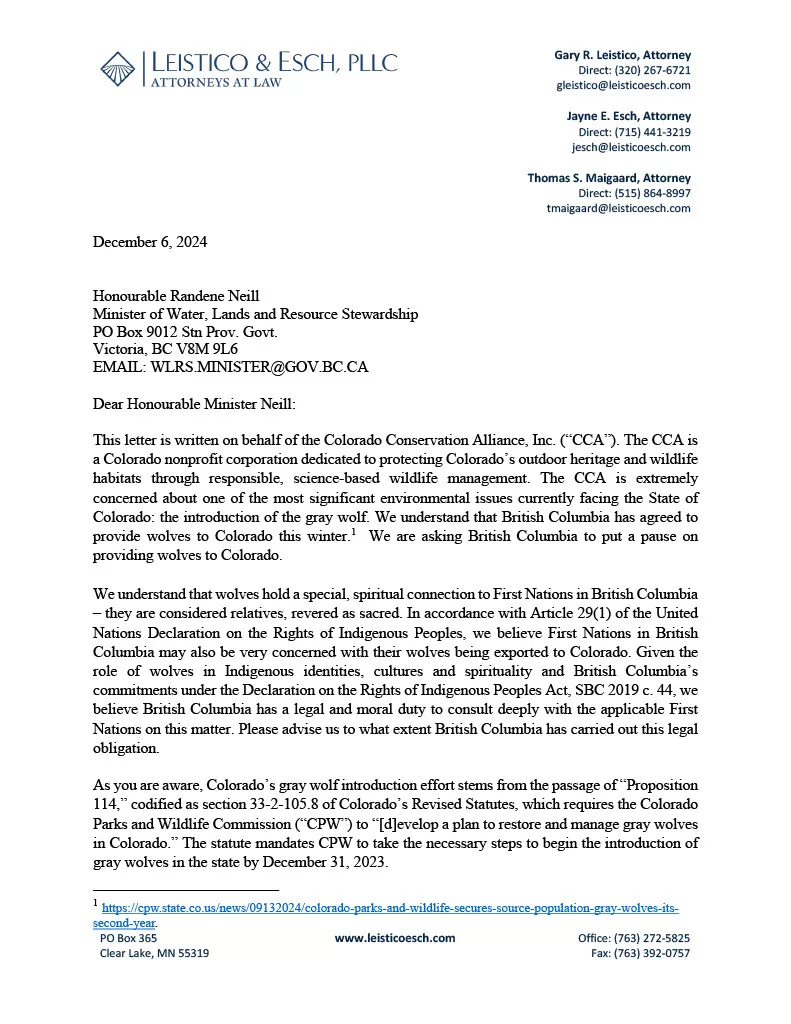
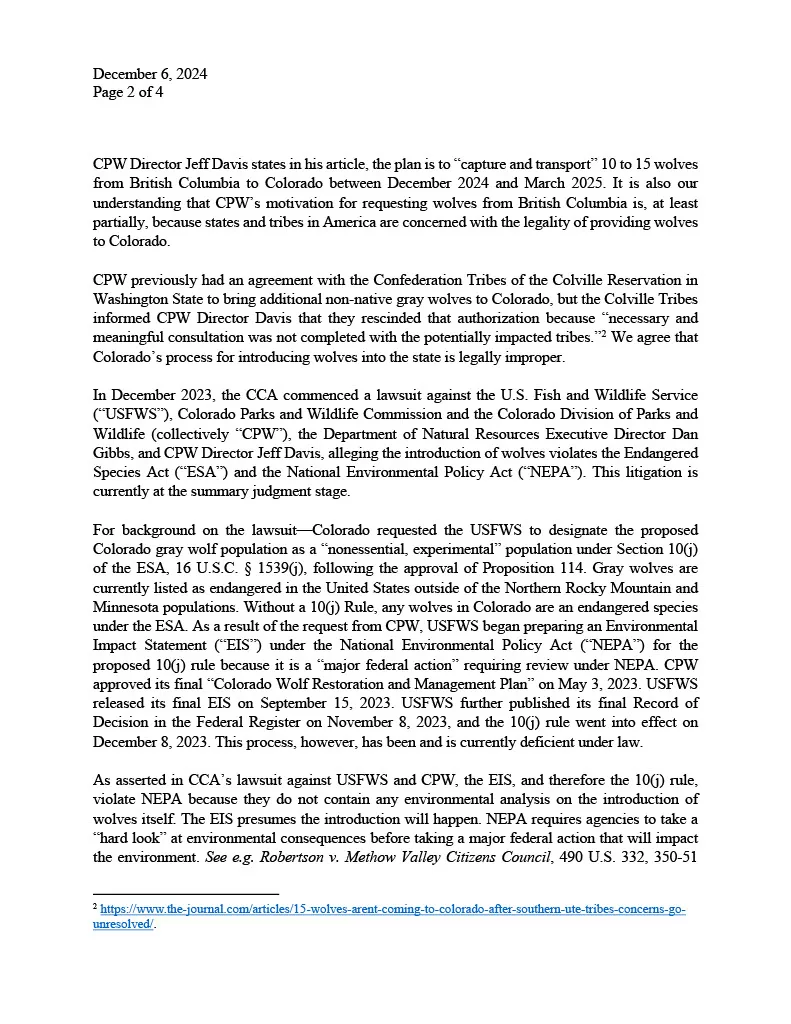
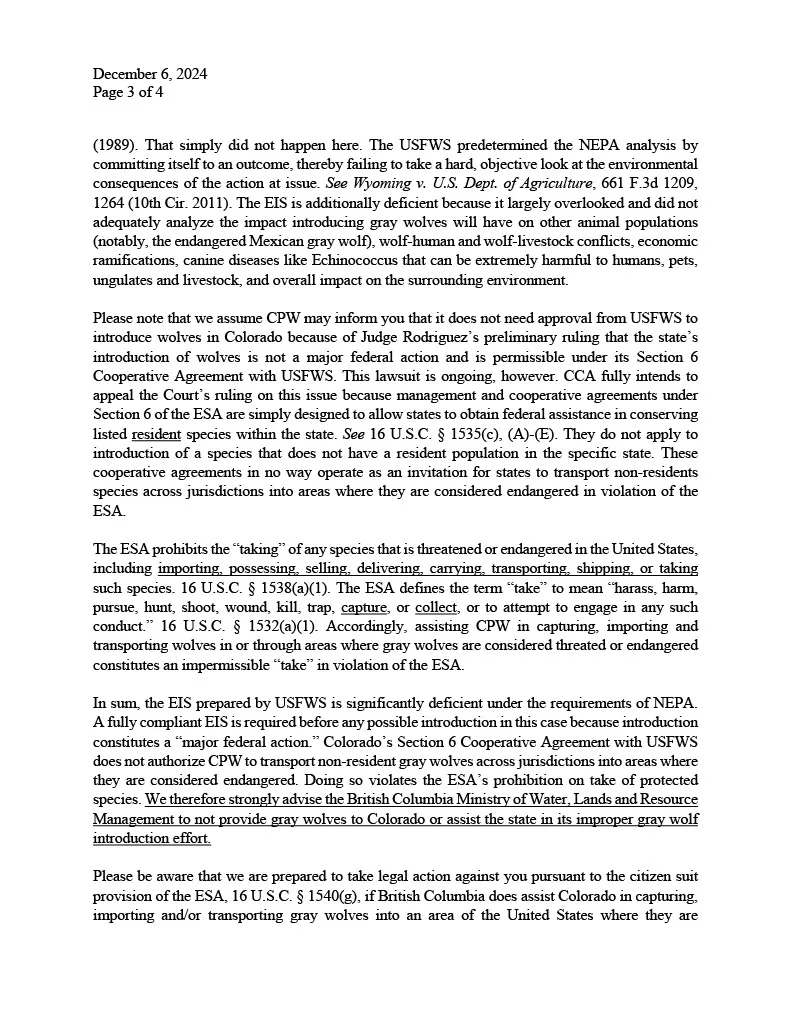
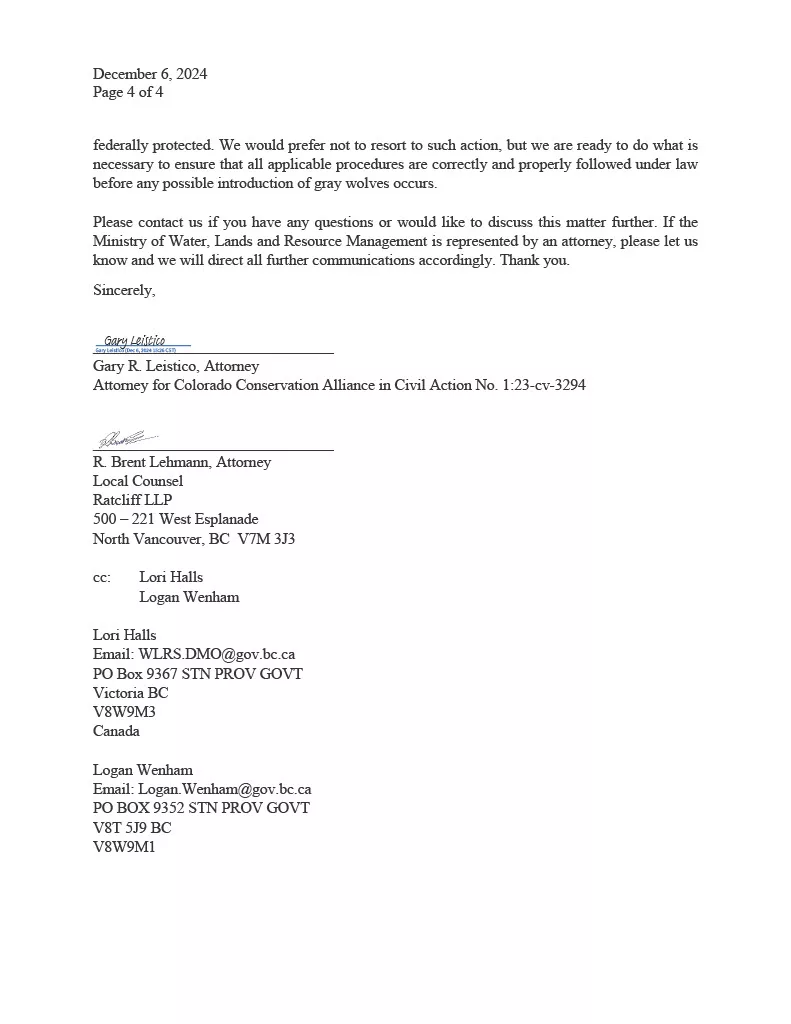
The Colorado Conservation Alliance also sent this letter to the Bureau of Land Management and US Forest Service on Dec. 2, 2024.
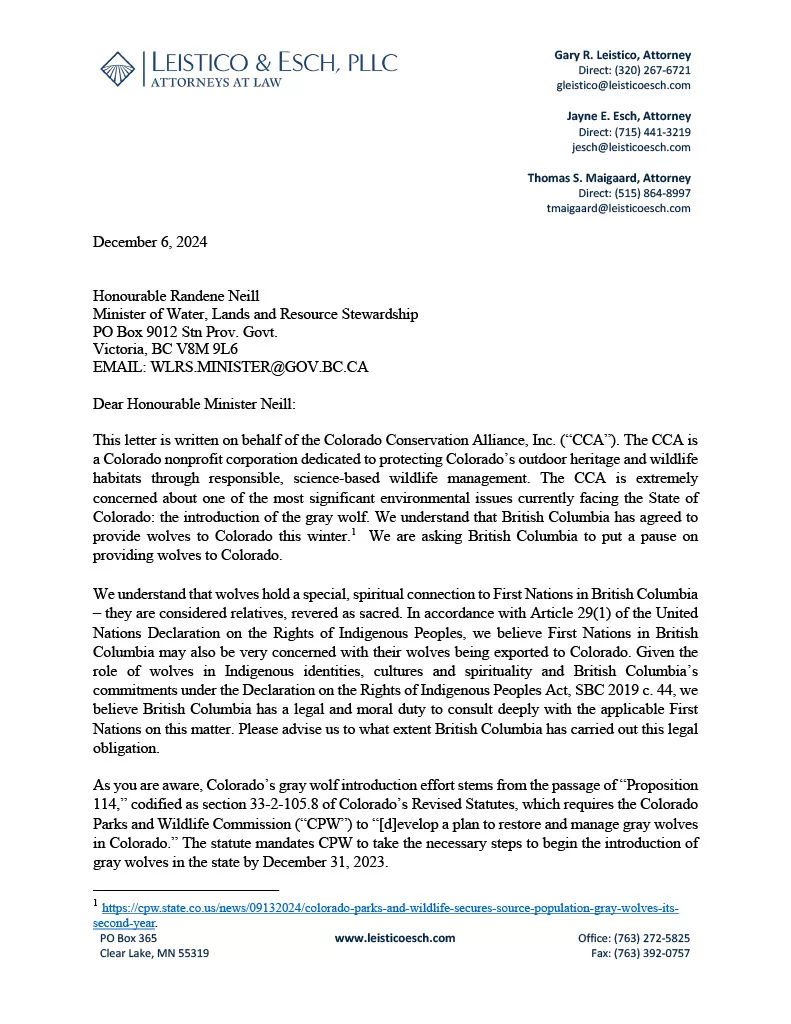
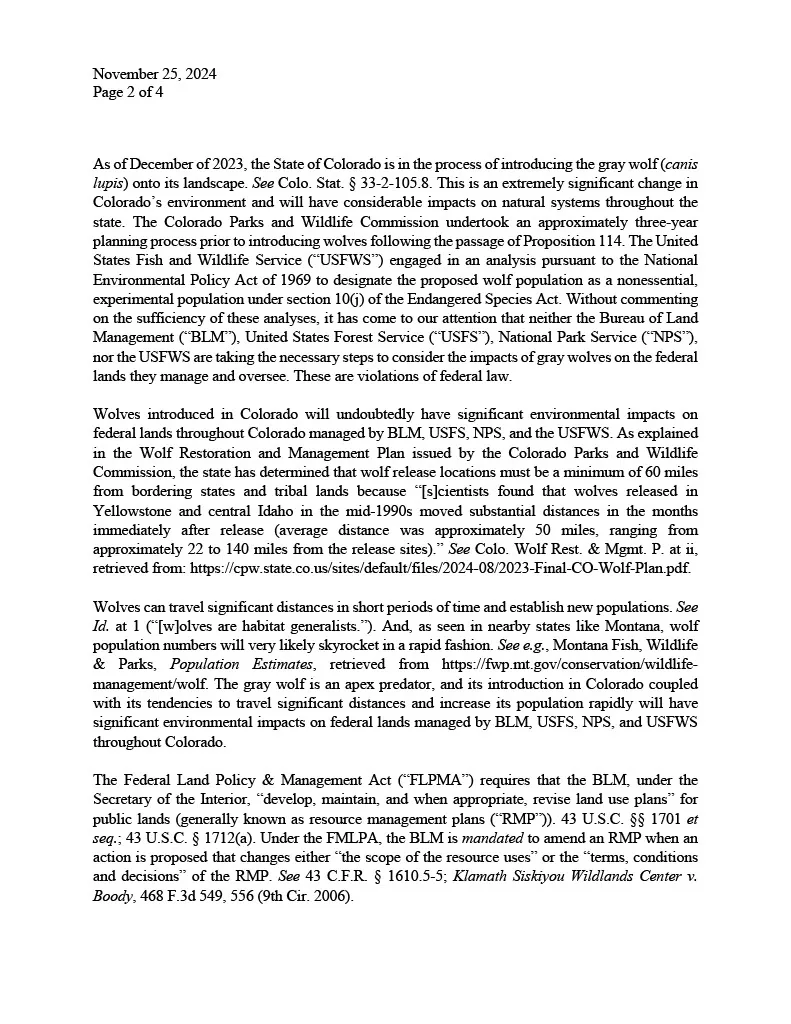
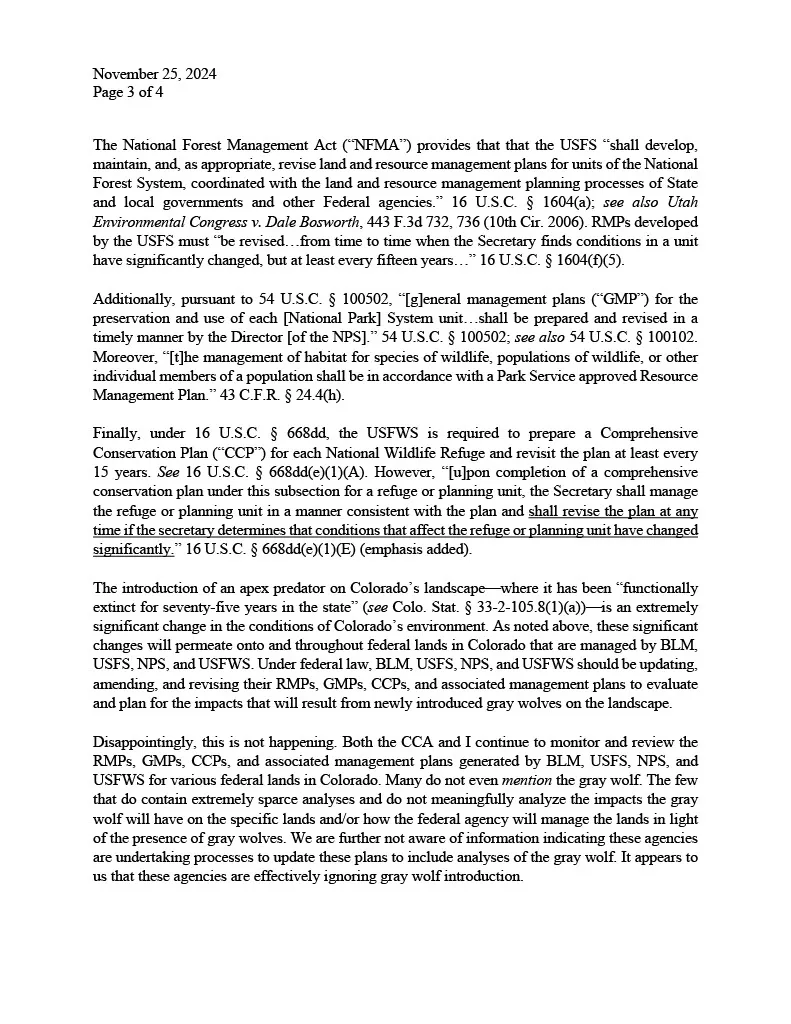
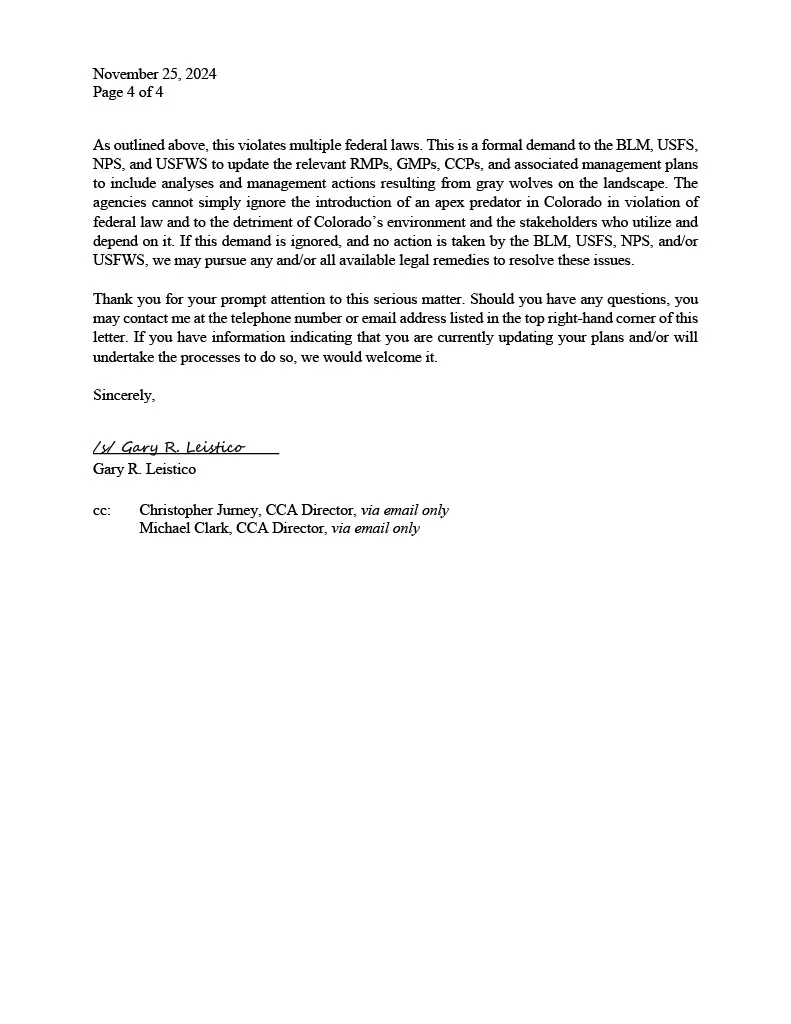
Steamboat Radio News Past Coverage of wolves in Colorado
- Nov. 14, 2024 — Wolf Update — November 14, 2024
- Nov. 3, 2024 — A collared wolf has crossed I-70 to the south, for the first time
- Nov. 3, 2024 — CPW responds to requests from Club 20 about Wolf Reintroduction
- Oct. 15, 2024 — Livestock producers have access to livestock protection dogs for free from USDA
- Oct. 11, 2024 — Fifth wolf pup has not been captured
- Oct. 8, 2024 — CPW Commission gets another letter asking to pause wolf reintroduction
- Oct. 6, 2024 — CPW Commission hears wolf updates at meeting
- Sept. 30, 2024 –– A 5th wolf pup is spotted in Grand County and will be captured by CPW
- Sept. 30, 2024 — Colorado Ag Organizations petition CPW Commission before further wolf releases happen
- Sept. 26, 2024 — No producers show for first Non-Lethal Wolf Conflict Reduction Training Meeting
- Sept. 23, 2024 — CPW confirms a cow and a calf killed by wolves in Grand County
- Sept. 16, 2024 — The Wolf Conflict Reduction program is hiring two field specialists
- Sept. 14, 2024 — The next set of wolves coming to Colorado will be from Canada
- Sept. 13, 2024 — Middle Park Stockgrowers ask CPW not to release any more wolves there
- Sept. 12, 2024 — Another wolf is dead in Grand County
- Sept. 10, 2024 — Grand County ranchers are reporting more wolf kills
- Sept. 9, 2024 — The Copper Creek Wolf Pack has been captured and CPW says the adult male was unhealthy and has died
- Sept. 9, 2024 –– Ranchers with the most wolf depredations ask U.S. Fish & Wildlife to take over wolf management
- Aug. 27, 2024 — The Copper Creek Wolf Pack is getting rounded up and relocated
- Aug. 23, 2024 — CPW confirms the next wolves introduced will again be in Northern Colorado
- July 31, 2024 — Eight more sheep confirmed killed by wolves in Grand County
- July 31, 2024 — Colville Tribe says they won’t send wolves to Colorado now
- July 29, 2024 — Two more sheep die from wolves in Grand County
- June 24, 2024 — CPW REPORTS LESS WOLF ACTIVITY IN ROUTT AND NONE IN MOFFAT
- June 20, 2024 — WOLF PUP CONFIRMED IN GRAND COUNTY
- June 19, 2024 — CPW CONFIRMS SOUTH ROUTT WOLF KILL
- June 17, 2024 — PRODUCER REPORTS SUSPECTED WOLF KILL IN SOUTH ROUTT COUNTY
- June 16, 2024 — CPW DIRECTOR JEFF DAVIS ANSWERS QUESTIONS AT JACKSON COUNTY GATHERING
- June 13, 2024 — CPW TO FORM WORKING GROUP REGARDING WOLF RESTORATION
- June 12, 2024 — NORTH PARK PRODUCER WHO LOSES CALF SPEAKS OUT
- June 10, 2024 — CPW CONFIRMS ANOTHER WOLF DEPREDATION IN JACKSON COUNTY THIS WEEKEND
- June 5, 2024 — Wolf Video posted from Grand County
- May 26, 2024 — DON GITTLESON SAYS ANOTHER CALF HAS BEEN KILLED BY WOLVES ON HIS RANCH
- May 15, 2024 — HERE’S THE LATEST LETTER TO MIDDLE PARK STOCKGROWERS FROM CPW DIRECTOR DAVIS
- May 14, 2024 — Suspected mountain lion kills the collared wolf
- May 6, 2024 — MIDDLE PARK STOCKGROWERS SEND EIGHT-PAGE LETTER TO CPW
- April 30, 2024 — GRAND COUNTY RANCHERS TO GET HELP WITH PROTECTING THEIR LIVESTOCK
- April 30, 2024 — NORTH PARK STOCKGROWERS SEND ANOTHER LETTER TO CPW AND GOV. POLIS
- April 28, 2024 —ANOTHER WOLF KILL IN GRAND COUNTY SUNDAY
- April 24-2024 — COLLARED GRAY WOLF ACTIVITY MAP RELEASED FOR APRIL
- April 23, 2024 — A WOLF HAS DIED, AND MIDDLE PARK STOCKGROWERS HEAR FROM CPW
- April 22, 2024 — MULTIPLE LETTERS SENT TODAY TO GOVERNOR POLIS AND CPW ASKING FOR ACTION ON WOLVES
- April 18, 2024 — FOUR MORE HEAD OF LIVESTOCK KILLED BY WOLVES IN GRAND COUNTY
- April 9, 2024 — AG PRODUCERS MEET WITH CPW OFFICIALS IN KREMMLING ABOUT WOLVES
- April 8, 2024 — ANOTHER CALF KILLED BY A WOLF OR WOLVES IN JACKSON COUNTY
- April 3, 2024 — A WOLF OR WOLVES HAVE KILLED A NEWBORN CALF IN GRAND COUNTY
- April 3, 2024 — Denver 7 Calf killed in first confirmed report of gray wolf depredation since wolves were released in December
- Feb. 29, 2024 — COLORADO PARKS AND WILDLIFE OFFICIALS COME TO STEAMBOAT SPRINGS TO TALK WOLVES
- Jan. 30, 2024 — CPW SENDS UPDATE ON WOLF SIGHTINGS SINCE 2004, AND MORE ON THE MAP
- Jan. 24, 2024 — ELECTED OFFICIALS GRILL DEPT. OF NATURAL RESOURCES AND CPW AT HEARING WEDNESDAY
- Jan. 22, 2024 — CPW GETS HARSH LETTER DEMANDING ANSWERS FROM ROBERTS AND MCCLUSKIE
- Jan. 19, 2024 — COLORADO’S NEXT WOLVES TO BE REINTRODUCED WILL BE FROM TRIBAL LANDS IN WASHINGTON
- Jan. 12, 2024 — CPW CONFIRMS WOLVES WERE IN SOUTH ROUTT BUT AREN’T (YET) IN MOFFAT
- Dec. 22, 2023 — FIVE MORE WOLVES ARE RELEASED BY COLORADO PARKS AND WILDLIFE
- Dec. 22, 2023 — CPW DENIES GITTLESON’S REQUEST TO IMPLEMENT 10(J) RULE ON JACKSON COUNTY WOLVES
- Dec. 21, 2023 — THREE OF THE FIVE WOLVES RELEASED IN COLORADO WERE IN PACKS THAT KILLED OR INJURED LIVESTOCK IN OREGON
- Dec. 19, 2023 — LIVESTOCK PRODUCERS RECEIVE WOLF UPDATE FROM CPW IN CRAIG MONDAY
- Dec. 13, 2023 — GITTLESON SAYS ANOTHER CALF WAS ATTACKED BY A WOLF TODAY
- Dec. 11, 2023 — COMPLAINT FILED IN U.S. DISTRICT COURT TO STOP WOLF REINTRODUCTION IN COLORADO
- Dec. 4, 2023 — KEEP YOUR PETS CLOSE AND CARRY A BIG STICK – CPW HAS ADVICE FOR LIVING WITH WOLVES
- Nov. 19, 2023 — THREE LAMBS KILLED BY A WOLF IN JACKSON COUNTY, SAYS RANCHER
- Nov. 17, 2023 – CPW AND CDA ANNOUNCE AGREEMENT TO WORK TOGETHER ON WOLF REINTRODUCTION
- Nov. 7, 2023 – U.S. FISH AND WILDLIFE SETS DATE FOR 10J RULE FOR WOLVES
- Oct. 6, 2023 – COLORADO WILL RECEIVE WOLVES FROM OREGON
- May 16, 2023 – POLIS VETOES 10J RULE WOLF BILL
- May 3, 2023 – CPW COMMISSION APPROVES FINAL WOLF RESTORATION AND MANAGEMENT PLAN
- May 2, 2023 – MANAGEMENT OF GRAY WOLVES REINTRODUCTION BILL PASSES IN STATE HOUSE
- May 2, 2023 –CPW MEETS THIS WEEK FOR FINAL WOLF MANAGEMENT PLAN
- April 27, 2023 – CPW CONFIRMS WOLF SIGHTING EAST OF KREMMLING
- April 8, 2023 – CPW WOLF COMMISSION MEETS IN STEAMBOAT SPRINGS
- April 3, 2023 – CPW TO PRESENT FINAL DRAFT WOLF RESTORATION AND MANAGEMENT PLAN IN STEAMBOAT SPRINGS
- March 28, 2023 – THE SOUTHERN UTE TRIBE ASKS THAT CPW RELEASES WOLVES ALONG I-70 CORRIDOR
- March 15, 2023 – TWO DOGS DIE FROM WOLVES IN JACKSON COUNTY THIS WEEK
- March 3, 2023 –COLORADO PARKS AND WILDLIFE COMMISSION RELEASES WOLF REINTRODUCTION MEETING RECAP
- Feb. 21, 2023 —WOLF 2101 RECAPTURED AND RECOLLARED IN JACKSON COUNTY
- Feb. 21, 2023 —10J RULE MEETINGS WITH REGARDS TO WOLVES SCHEDULED FOR NW COLORADO BY US FISH AND WILDLIFE
- Jan. 17, 2023 —STATE LEGISLATORS HEAR MORE ON WOLF REINTRODUCTION AT JOINT COMMITTEE HEARING
- Dec. 13, 2022 —MORE WOLVES VISIT GITTLESON PROPERTY IN JACKSON COUNTY THIS WEEK
- Dec. 12, 2022 —NORTH PARK RANCHERS MEET WITH CPW REGARDING WOLF REINTRODUCTION PLAN
- Dec. 10, 2022 —CPW RELEASES DRAFT COLORADO WOLF RESTORATION AND MANAGEMENT PLAN
- Nov. 19, 2022 —ANOTHER WOLF ATTACK REPORTED IN JACKSON COUNTY
- Oct. 9, 2022 —WOLVES ATTACK CALVES IN RIO BLANCO AND JACKSON COUNTIES
- July 14, 2022 —CPW UPDATES THE WOLF PACK IN JACKSON COUNTY
- June 20, 2022 ––WOLF MANAGEMENT DISCUSSED AT MEETING IN WALDEN
- June 15, 2022 —WOLVES IN NORTH PARK ARE SUBJECT AT MEETING MONDAY, JUNE 20
- May 30, 2022 —THE GITTLESON RANCH LOSES ANOTHER CALF TO WOLVES, THEY SAY
- May 5, 2022 —AT LEAST TWO MORE CALVES KILLED BY WOLVES ON GITTLESON RANCH
- May 10, 2022 ––THIRD CALF DIES ON JACKSON COUNTY RANCH; CPW DOES NECROPSY
- April 11, 2022 —A NEW LITTER OF WOLF PUPS IS EXPECTED IN JACKSON COUNTY
- March 17, 2022 —WOLVES ATTACK ANOTHER DOMESTIC COW IN JACKSON COUNTY
- Feb. 10, 2022 – MONTANA STOCKGROWERS VOICE SUPPORT FOR COLORADO RANCHERS OVER THE WOLVES
- Feb. 9, 2022 – WOLF MANAGEMENT DISCUSSED BY LOCAL RANCHERS AND OFFICIALS AT FORUM IN STEAMBOAT
- Jan. 22, 2022 – WOLF MITIGATION OPTIONS
- Jan. 19, 2022 – ANOTHER COW KILLED OVERNIGHT IN NORTH PARK BY WOLVES
- Jan. 18, 2022 – TWO MORE COWS ATTACKED BY WOLVES IN JACKSON COUNTY TUESDAY
- Jan. 12, 2022 – CPW ALLOWS WOLVES TO BE HAZED IN EMERGENCY DECLARATION
- Jan. 10, 2022 – A WOLF PACK KILL IS REPORTED IN JACKSON COUNTY OVER THE WEEKEND
- June 9, 2021 – WOLF DEN WITH PUPS CONFIRMED IN NW COLORADO